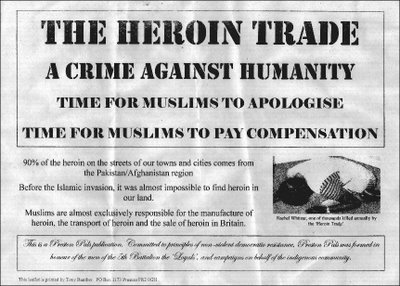Over at spiked, the website of the cranky sect formerly known as the Revolutionary Communist Party, there is a particularly silly and ignorant article by Brendan O’Neill calling for the repeal of the 2006 Racial and Religious Hatred Act, which he describes as “an attack on what is for spiked the most important freedom of all, the freedom upon which all other freedoms are built, the freedom without which we cannot be free-thinking, free-associating, independent citizens: freedom of speech”. The legisation was, O’Neill asserts, motivated by an “outrageously Orwellian desire to make it a crime to ridicule religion”.
The reality is that the Labour government’s decision to introduce legislation criminalising incitement to religious hatred was motivated by the entirely admirable desire to end an anomaly whereby adherents of faiths defined as mono-ethnic (Jews, Sikhs) were covered by the racial hatred law but adherents of faiths defined as multi-ethnic (Muslims, Hindus) were not. This loophole has allowed racists and fascists to incite hatred against Muslims in a way that would have resulted in prosecution under the racial hatred law if they had used the same terms to attack Jews. In its original form the religious hatred bill just went through the relevant section of the Public Order Act and where this referred to “racial hatred” inserted the words “and religious”.
This no more criminalised ridicule of religion than the racial hatred law criminalises ridicule of race. A law against incitement to racial hatred has been on the statute books since 1965. If O’Neill can point us to a single example from the past 45 years of anyone being prosecuted for subjecting a minority ethnic community or its members to ridicule we would be interested to hear from him. The late Bernard Manning notoriously made a career out of telling obnoxious racist jokes, without ever falling foul of the racial hatred law – for the simple reason that ridicule, however offensive, does not qualify as incitement to hatred.
Unfortunately the original religious hatred bill was sabotaged in the House of Lords with the adoption of an amendment formulated by the Lib Dem peer Lord Lester, and the bill was subsequently passed by the House of Commons in this amended form to become the current Racial and Religious Hatred Act. Lord Lester’s formulation required that the words and actions complained about should be “threatening”, which means that it is still legal for racists to incite hatred against Muslims as long as they avoid explicit threats. And, crucially, the Lester amendment required that the prosecution should prove intent – which is almost impossible to achieve.
This was the flaw in the original 1965 law against racial hatred and led to it being changed in 1976 to remove the requirement to prove intent. In 1968 an organisation called the Racial Preservation Society was prosecuted for inciting racial hatred in connection with the distribution of a publication attacking Black immigration. While the publication clearly had the objective effect of inciting racial hatred, the Racial Preservation Society denied that this was their subjective intent. Their purpose, they piously told the court, was merely to inform the public about the dangers of immigration. The prosecution was unable to prove otherwise and the defendants were acquitted.
We recently witnessed a repetition of this farce in connection with a prosecution under the Racial and Religious Hatred Act. A BNP activist, one Anthony Bamber, was charged with incitement to religious hatred after distributing a leaflet that held the entire Muslim community responsible for the heroin trade. “Before the Islamic invasion”, the leaflet declared, “it was almost impossible to find heroin in our land. Muslims are almost exclusively responsible for the manufacture of heroin, the transport of heroin and the sale of heroin in Britain.”
The effect of the leaflet was clearly to incite hatred against Muslims, and if the same sort of language had been directed against Jews a prosecution under the racial hatred law would almost certainly have succeeded. However, as we pointed out at the time, given the weakness of the religious hatred law it was unlikely that Bamber would be convicted. And so it proved.
In her directions to the jury the judge told them, entirely accurately, that they were obliged to “consider if the words were threatening” and added: “Mr Bamber says that his intention was to publicise his campaign with no intention to stir up religious hatred. You must be sure that when he did the act of distribution, he intended to stir up religious hatred.” Unsurprisingly, as the leaflet contained no explicit threats and intent could not be proved, the jury acquitted Bamber. No doubt Brendan O’Neill and the spiked crowd celebrated this fascist’s victory as a welcome contribution to their campaign against “nannying New Labour laws and other unnecessary legislation”.
In short, the religious hatred law is utterly toothless and will never – we can confidently predict – lead to the successful prosecution of a single anti-Muslim hatemonger. This is the legislation Brendan O’Neill wants to repeal on the grounds that it represents a vicious attack on “freedom of speech”. What is in fact needed is new legislation, along the lines of the original religious hatred bill before it was sabotaged by Lord Lester, which will provide the Muslim community with the same defence in law as the Jewish community rightly enjoys. Until then, racists and fascists will continue to incite hatred against Muslims with impunity.

